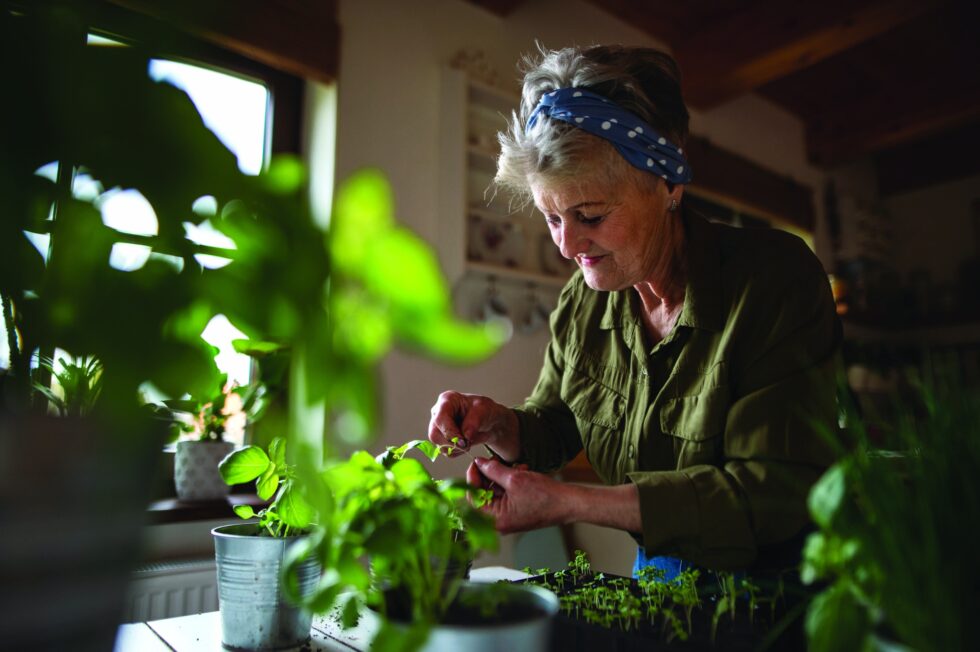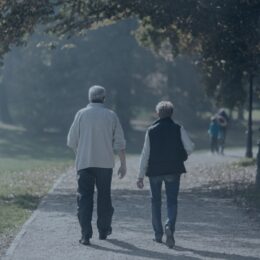
By Gina Teeple
Director of Development & Ministry Relations
ADULTS AGED 50 OR OLDER ARE MORE LIKELY THAN EARLIER GENERATIONS TO BE DIVORCED, SEPARATED, OR NEVER MARRIED. ADDITIONALLY, 1 IN 6 ADULTS AGED 55 AND OLDER DO NOT HAVE CHILDREN.
Sarah doesn’t mind living alone most of the time. Her husband passed away a few years ago, and she still misses him dearly. She also wishes her adult children lived closer, but she enjoys her independence and values her solitude. However, there are moments when the weight of aging alone feels heavier than usual.
As the population ages, an increasing number of adults find themselves growing older without a partner or immediate family by their side. According to a recent article in The New York Times, the number of single occupant households has drastically increased in America. In fact, 36 percent of households headed by someone 50 or older have a single occupant. That means nearly 26 million Americans 50 or older are living alone, or “solo aging.”
For some, aging alone is a conscious choice, driven by a desire for independence or a reluctance to compromise personal freedom. Others may find themselves in this situation due to factors like the loss of a spouse, estrangement from family, or geographic isolation.
If you are a solo ager, it is important to remember that living alone doesn’t mean you are alone. You are part of a bigger family in Christ. Paul tells us in his letter to the Galatians that “in Christ Jesus (we) are all sons of God, through faith” (3:26 ESV). In fact, Jesus reminds us throughout the Gospels that family isn’t limited to biology. In Matthew 12:46-50 (ESV) we read:
“While Jesus was still talking to the crowd, his mother and brothers stood outside, wanting to speak to him. Someone told him, ‘Your mother and brothers are standing outside, wanting to speak to you.’
“He replied to him, ‘Who is my mother, and who are my brothers?’ Pointing to his disciples, he said, ‘Here are my mother and my brothers. For whoever does the will of my Father in heaven is my brother and sister and mother.’”
If the previous passage seems a bit disregarding or disrespectful to you, don’t worry. Jesus takes care of his mother. As he is dying on the cross, he makes sure she will be cared for after his death. In John 19:25-27 (ESV), we read:
“Near the cross of Jesus stood his mother, his mother’s sister, Mary the wife of Clopas, and Mary Magdalene. When Jesus saw his mother there, and the disciple whom he loved standing nearby, he said to her, ‘Woman, here is your son,’ and to the disciple, ‘Here is your mother.’ From that time on, this disciple took her into his home.”
This is a beautiful example of how we, as Christians, are called to love and provide for one another—especially when someone does not have a biological family to care for them.
This love has deeply impacted Sarah. She finds solace in her faith and actively participates in her local church community. Through weekly worship services, Bible study groups, and volunteer opportunities, Sarah has forged meaningful connections with brothers and sisters in Christ who provide her with companionship and support. You can do the same!
Are you a solo ager? These resources will help!
Eldercare Locator
Eldercare Locator will connect you to local resources related to health, support services, housing, insurance and benefits, transportation, and elder rights. It is a free public service of the U.S. Administration on Aging.
You can connect with trained information and referral specialists who will provide you with personalized assistance based on your specific needs and location by:
► Dialing the toll-free number (800-677-1116);
► Emailing eldercarelocator@n4a.org; or
► Using the online chat feature at https://eldercare.acl.gov
Programs for All-Inclusive Care for the Elderly (PACE)
Programs for All-Inclusive Care for the Elderly are comprehensive healthcare programs designed to meet the needs of older adults who require nursing home-level care but prefer, and are motivated to, live in their own homes or communities. PACE programs focus on preventive care and managing chronic conditions. These programs are designed to improve health outcomes and reduce the need for hospitalizations or institutional care. PACE programs are typically funded through Medicare and Medicaid, making them accessible to people with limited financial resources.
HealthFinder
This online resource is provided by the U.S. Department of Health and Human Services and offers articles, videos, and interactive tools to help older adults make informed decisions about their health.
The MyHealthFinder tool is a great resource that provides guidelines on screenings, immunizations, and preventive care specifically recommended for older adults. HealthFinder also offers other online tools, such as health quizzes and interactive checklists. These will help you assess your health status, identify potential risk factors, and make informed decisions about your health care needs.
National Directory for Home Modification and Repair
The National Directory for Home Modification and Repair provides a centralized database of home modification and repair services, which may include installing accessibility features, like ramps, grab bars, stairlifts, and bathroom modifications to accommodate mobility limitations. All of these things are essential to make your home more accessible, safe, and suitable for aging in place.
Yet to all who did receive him, to those who believed in his name, he gave the right to become children of God—children born not of natural descent, nor of human decision or a husband’s will, but born of God.
John 1:12-13 (ESV)


